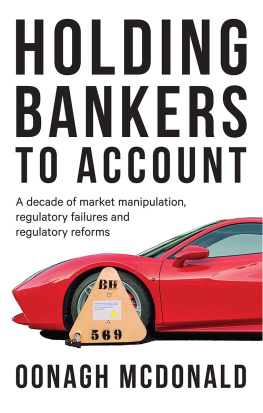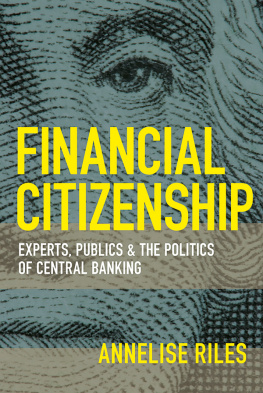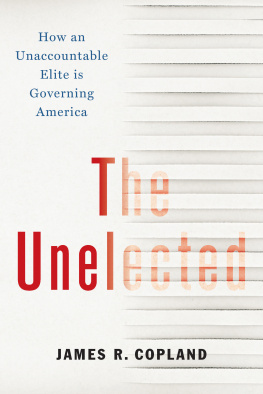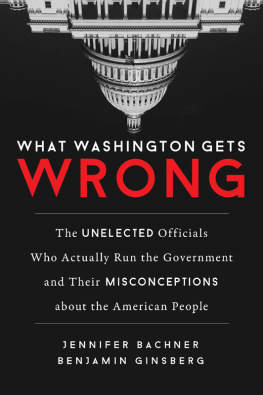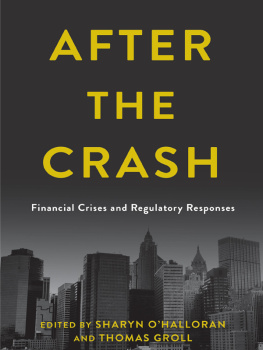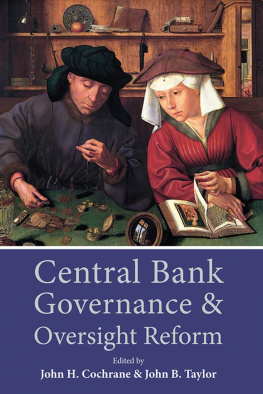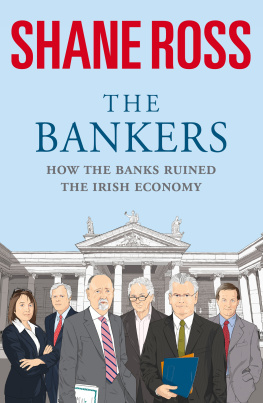UNELECTED POWER
The Quest for Legitimacy in Central Banking and the Regulatory State
Paul Tucker
PRINCETON UNIVERSITY PRESS
Princeton & Oxford
Copyright 2018 by Princeton University Press
Published by Princeton University Press, 41 William Street, Princeton, New Jersey 08540
In the United Kingdom: Princeton University Press, 6 Oxford Street, Woodstock, Oxfordshire OX20 1TR
press.princeton.edu
Jacket design by Faceout Studio
Jacket image courtesy of Shutterstock
All Rights Reserved
ISBN 978-0-691-17673-4
Library of Congress Control Number: 2018935378
British Library Cataloging-in-Publication Data is available
This book has been composed in Minion Pro text with Helvetica Neue LT Std display
Printed on acid-free paper.
Printed in the United States of America
10987654321
CONTENTS
PREFACE
Of course, if the Bank were ever given monetary independence, you might need to lose bank supervision in case you became an overmighty citizen. Those were the words of the head of the UK Treasury, Terry Burns, to Bank of England Governor Robin Leigh-Pemberton in his London Threadneedle Street office over a quarter of a century ago. I was present as the governors private secretary, and I have been thinking about them ever since.
Less than a decade later, when Britains Blair-Brown government was elected in 1997, the Bank of England did regain independence in monetary policy, after an interval of over sixty years, and as predicted it duly lost banking supervision. But within fifteen years, supervision had been transferred back, in the aftermath of the 20072009 financial crisis. Whats more, supervision came with wider and greater powers than ever before. As those of us then at the Bank worked with government and Parliament to frame the new regime, nothing loomed larger in Bank counsels than a desire to avoid being an overmighty citizen. More positively, we fervently wanted the Bank and its policy makersindependent, powerful, but unelectedto enjoy legitimacy.
This was not just a matter of public virtue, although I like to think that played a part. We were aware of a degree of schizophrenia among the London elite about the transfer of powers to the Bank. Asked whether it was a good thing that the central bank was regaining its historic mission for ensuring the stability of the banking system, the response seemed to be overwhelmingly positive. Asked whether they were comfortable with the concentration of power in the Bank, the same metropolitan figuresnot a few of them former senior government officialswere at best lukewarm.
For these reasons, the title of this book was initially Overmighty Citizens?, recalling the question of whether late-medieval England was destabilized by the overmighty subjects among the nobility whose power and might rivaled or eclipsed that of the king. But even though Englands Wars of the Roses have found a vast modern television audience around the world, and even though the problem of overmighty citizens famously preoccupied republican Florence, I found that when explaining what the book is about, I invariably say unelected power.
The problemand so the bookis by no means limited to Britain, or to central banking. Concerns about similar delegations exist across the developed world, affecting huge swathes of public life given the extent to which elected politicians have been shedding their powers. Americans call it the administrative state; Europeans, with a slightly narrower focus, the regulatory state. Labels aside, central banks occupy a special place in this constellation. For now at least, their governors have become the poster boys and girls of the technocratic elite. As I discuss, whether in the United States or Europe, that has not met with universal applause, raising questions about the legitimacy and sheer reach of central banks powers and roles.
This book, then, is about whether and how democratic societies can find their way through these issues. It is about powerunelected power. How to contain it, hold it accountable, legitimize it. But it is also about how to make the power of independent agencies useful, serving societys needs. And it is about the importance of recognizing that formally delegating power in one area sometimes unavoidably entails bestowing de facto power in others.
At a personal level, it amounts to an attempt to make sense of the reservations of three of the Bank of Englands biggest postWorld War II figuresGeorge Blunden, Eddie George, and Mervyn Kingabout becoming a powerful independent authority. I came to share that institutional caution over my thirty-odd years at the Bank, a dozen or so of which were spent as a policy maker, finally as deputy governor, and the vast bulk of which happened to be devoted to designing or redesigning regimes for monetary policy, stability policy, or regulation, including in Hong Kong after the 1987 stock market crash.
Holding public office is an enormous privilege. It requires doing, thinking, planning, managing and, perhaps most crucially today, explaining. In that spirit, the first part of the book concludes with the principles that, in my mind at least, guided our contribution to the reconstruction of the UK regime after the 20072009 crisis.limits of unelected power. Among other things, we leaned against suggestions that we take on responsibility for supervising securities exchanges and trading platforms, and that we use our lending policies to steer the allocation of credit. Much of the remainder of the book is an exploration of how those Principles for Delegation , as I call them, fit with the deep values and beliefs of mature democratic societies, an exercise I had time for when I took up a fellowship at Harvard in late 2013.
The book takes for granted that institutions matter. While that has become mainstream among economists over the past quarter of a century, and while the institutions of government are increasingly studied by empirical political scientists, it has largely fallen out of fashion among political theoriststhe people who map out the moral grounds and goals of public affairs. From the seventeenth to the nineteenth centuries, writers as central to our traditions as Locke, Montesquieu, Hegel, and Mill thought deeply about the structure of the state, and practical state builders as illustrious as Alexander Hamilton and James Madison did likewise. Today, however, with the exception of debates around the EUs governance, discussion of whether the emergence of independent government agenciesand delegation to agencies more generallyrepresents a profound change in our politics is too frequently confined to lawyers and to academics specializing in regulation or government effectiveness.
The broader discussion ought to be about marrying values to institutions and, thus, to incentives. The book argues that power, welfare, incentives, and values have to be considered together if the institution of delegated unelected power is to be sustainable in our democracies. I hope that it will help to provoke more political theorists and others to join Philip Pettit, Henry Richardson, Pierre Rosanvallon, and Jeremy Waldron in reviving interest in what our values entail for the structure of government, giving legitimacy equal billing with discussions of justice.
The book aims to be practical, offering concrete proposals. Their core was first set out publicly in the 2014 Gordon Lecture, which I was honored to be asked to give by the Harvard Kennedy School. By then I had
In pursuing the questions raised by unelected power, the book draws on political economy, political theory, and some political science and public law, as well as on my own and others personal experiences. Embarking on trying to weave all that together, I owe enormous thanks to many academics, legislators, officials, and commentators around the world who gave me their time, and in many cases have become good friends.
Next page

